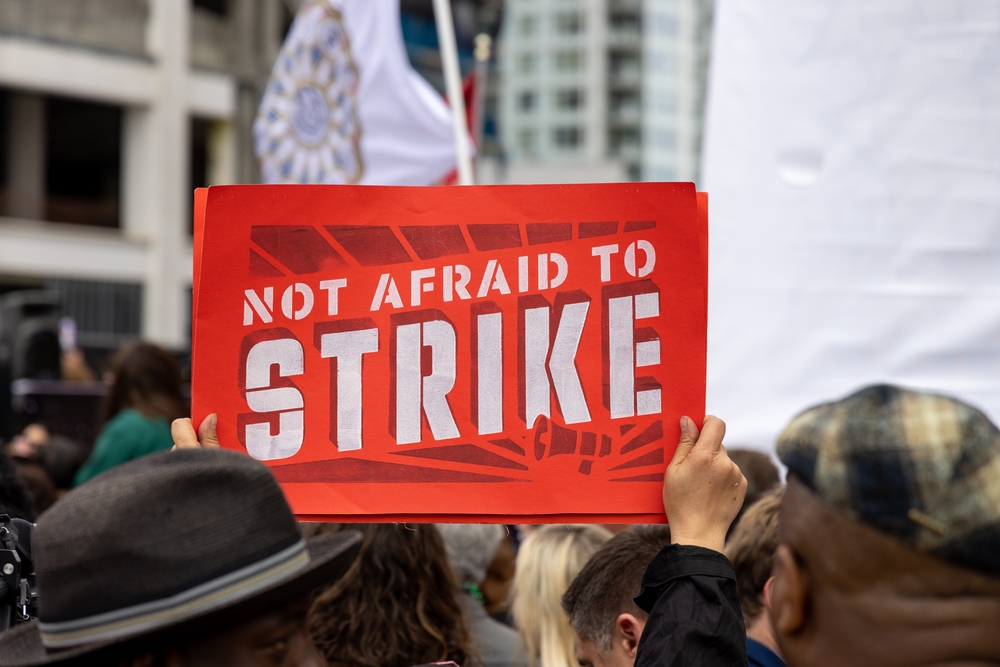Posts tagged California Labor Federation

Gov. Newsom rejects bill to give unemployment checks to striking workers
October 2, 2023 // The fund the state uses to pay unemployment benefits is already more than $18 billion in debt. That's because the fund ran out of money and had to borrow from the federal government during the pandemic, when Newsom ordered most businesses to close and caused a massive spike in unemployment. The fund was also beset by massive amounts of fraud that cost the state billions of dollars.
Opinion: Few Californians Belong, But Unions Scored Big in Legislature this Year
September 26, 2023 // The state’s Unemployment Insurance Fund, or UIF, which is supported by payroll taxes on employers, has about a $15 billion deficit because the state borrowed heavily from the federal government to keep benefit checks flowing during the downturn sparked by Newsom’s orders shutting down much of the state’s economy to battle COVID-19. If the state doesn’t repay the loans, which is likely, the federal government imposes higher payroll taxes on employers to settle the debt. Employers want a veto. Citing the UIF’s crushing debt, Newsom indicated that he’s skeptical.
Commentary: Few California workers belong to unions, but they scored big in Legislature this year
September 20, 2023 // Previously, the Legislature had helped unions gain members by declaring home care and child care workers to be public employees and thus capable of being unionized. In fact, as the Legislature’s session was winding down, it approved a new contract for the latter that included hefty raises. Extending similar status to other service sectors is one possibility. Meanwhile, the bills setting new minimum wages for fast food and health care workers would seem to open the door for similar efforts in other segments of the economy that have large numbers of employees with relatively low salaries.

California proposes paying unemployment benefits to striking workers
August 24, 2023 // One of the main sponsors of the bill, state Sen. Anthony Portantino, said, “I think there’s more of a recognition that hardworking men and women need to have a seat at the table to discuss economic expansion.” He added, “It is embarrassing for California that we don’t have unemployment insurance for striking workers.” The deadline for California lawmakers to introduce new bills was in February, but state legislators can still rework unrelated bills, in a move called “gut-and-amend,” to circumvent the missed deadline and include the new language. The last-minute legislative push is backed by the California Labor Federation, which is led by former state Assemblymember Lorena Gonzalez. When Gonzalez tried to pass a similar bill in 2019, it eventually passed both chambers but was vetoed by Gov. Gavin Newsom.
‘Employees come second’: Why California’s legislative staffers hope to unionize
July 21, 2023 // Unlike other state workers, legislative staff are banned from unionizing to advocate for better working conditions. That could soon change under a bill making its way through the State Capitol. Assembly Bill 1, authored by Assembly member Tina McKinnor (D—Inglewood), would provide a framework for legislative staff to form a union. California’s over 200,000 other public employees are able to unionize. But legislative staff are notably excluded from the law, the Dills Act, that established those rights in the 1970s. AB 1 is the fifth attempt in recent years to change that.
California Independent Contractor Law Faces Withering Attacks
June 16, 2023 //
California labor shows off its political muscle
May 10, 2023 // His speech followed appearances earlier Monday by Assembly Speaker Anthony Rendon of Lakewood, Senate President Pro Tem Toni Atkins of San Diego and Attorney General Rob Bonta. Atkins pledged again to protect workers’ rights, while Rendon re-upped his backing of a bill to let legislative staffers form a union. The number of potential voters is staggering and, at times, consequential: The Labor Fed claims 2.1 million members in 1,200 local unions and the Building Trades says it has some 450,000 members in 157 affiliated unions. Union members are also a key source of possible volunteers to canvas neighborhoods, run phone banks and distribute campaign flyers. Then there’s the money — a lot of money. As CalMatters’ data journalist Jeremia Kimelman calculated Monday, in 2021-22 alone the Labor Fed spent nearly $2.7 million on campaigns and the Trades another $2.7 million, including more than $1 million to the state Democratic Party and local parties. In addition, the Labor Fed spent $877,000 on lobbying in 2021-22, while the Trades put in nearly $1.2 million.
Opinion: It Turns Out Anti-Gig Economy Law AB 5 Was Tarnished by ‘Backroom Dealing’
March 30, 2023 // The court cited Gonzalez’s own damning tweets, interviews, statements and a Washington Post op-ed, even suggesting that AB 5 is rooted in “corruption, pure spite, and naked favoritism.” Indeed, the judges’ line of questioning at the July 13, 2022, hearing signaled their dismay at Gonzalez’s “shocking statements,” noting that Uber was the focus of her attention. The plaintiffs’ complaint included a list of disparaging remarks by Gonzalez, such as calling Uber’s chief legal counsel “full of shit” on Sept. 18, 2019 — the same day Gov. Gavin Newsom signed AB 5 into law.
A Win For California’s App-Based Drivers
March 17, 2023 // In an ironic twist, California Attorney General Rob Bonta argued in favor of Prop. 22 to the Court of Appeals even though he voted for AB5 when he was an assemblyman in the California state legislature and was personally opposed to Prop. 22. The state correctly asserted that the will of the voters should prevail, and the Court of Appeals agreed. Former assemblywoman and author of AB5 cried foul about Monday’s ruling, claiming the “system is broken” and that the appeals court “chose to stand with powerful corporations over working people, allowing companies to buy their way out of our state’s labor laws.” Gonzalez, who now heads the California Labor Federation representing 1,200 unions in the state, has no such concerns about the millions of independent contractors and small businesses adversely affected by her disastrous law. From transcribers and translators to sign-language interpreters, videographers, wedding planners, regional theaters, pharmacists, the independent film industry, and more, AB5 has wielded a wrecking ball to the independent workforce in California, particularly impacting female entrepreneurs who have been disproportionately harmed by the law.
California Court Rebukes War on Workers
March 16, 2023 // This obviously poses an existential threat to emerging app-based companies that rely on a contractor model, but it also posed an entirely predictable threat to many traditional professions where workers eschew the 9–5 cubicle or factory floor work model. When the Legislature codified Dynamex via Assembly Bill 5, which went into effect in January 2020, it exempted many industries — primarily those with the most influential lobbies. Nevertheless, economic destruction ensued. Companies eliminated jobs rather than hire people as salaried employees. Publications — including Vox, which ran a piece championing AB 5 — laid off its California stringers. Musical groups that relied on gig workers had to shutter their operations. All types of freelance workers — from photographers to sign-language interpreters to rabbis — suddenly found themselves in a pickle. The same Gov. Gavin Newsom who used his vast executive powers to suspend laws during the COVID pandemic refused to suspend AB 5, even as people who were forced to stay at home lost their stay-at-home freelance opportunities. Some Californians embraced the workaround of starting an LLC, but that imposed new costs on workers who already were struggling. Dynamex Operations West v. Superior Court of Los Angeles
